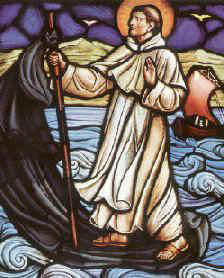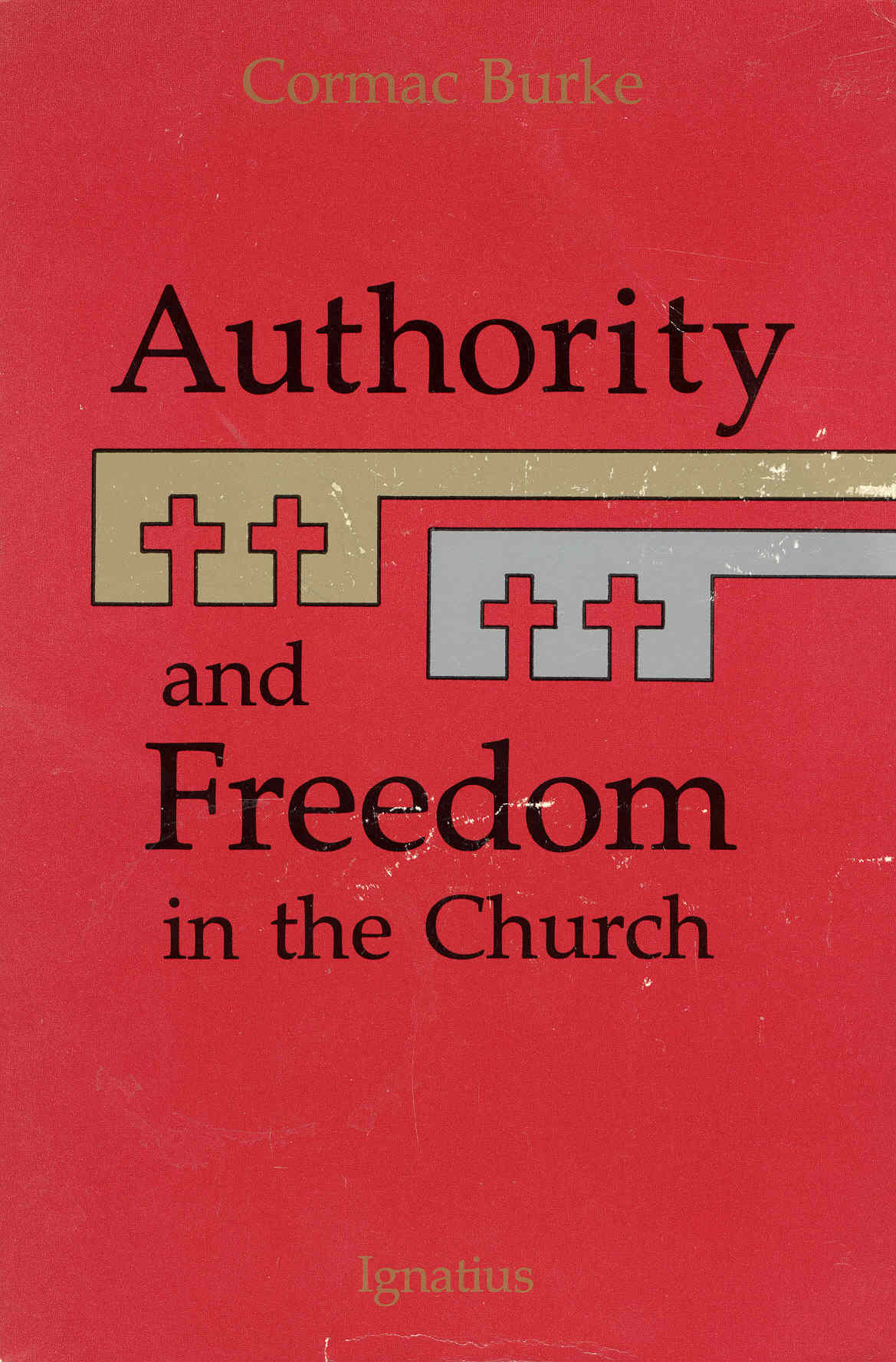|
To work for the proper implementation of canon law is to play an extraordinarily constructive role in continuing the redemptive mission of Christ. Pope John Paul II |
|
|
|
|
Resolution 1152 x 864 |
Updated 3 jan 2013 |
Review of Cormac Burke, Authority and Freedom in the Church (Ignatius, 1988), 235 pp. |
|
Edward Peters, Review of C. Burke, Authority and Freedom in the Church (1988), in Studia Canonica 24 (1990) 241-243.
See also
Msgr. Cormac Burke retired Rotal auditor
|
Monsignor Cormac Burke, an Irish
civil and canon lawyer now serving as an auditor on the Roman Rota, did not set
out to write a book on canon law, but his challenging discussion of authority
and freedom in the Church has significant implications for modem canon law.
Burke’s primary subjects in this book are theological, and specifically,
pastoral. Nevertheless, I hope that it is not a disservice to his study to pass
over those topics and focus on those discussions that bear more directly on
canon law. Preliminarily, I would note that the study is intellectual, but not
academic. This, combined perhaps with a European distaste for footnotes,
sometimes leaves one without an apparatus for identifying sources. Nevertheless,
the sources that are identified are predominately Sacred Scripture, Vatican II,
and the 1983 Code of Canon Law, which canonists will recognize as the
triple founts of Pope John Paul II's plan for renewal in the Church.
The very first notion developed by
Burke is one of keen interest to canonists. In discussing "The Lawless
People of God?," Burke points out that, fecund though the conciliar notion
of people of God is, that concept, according to the Council itself, flows from
and is secondary to the deeper notion of communio, which he terms
"the most condensed theological expression of the mystery of the
Church" (p. 9). But the criteria of full communion expressed in c. 205, he
notes, are faith, sacraments, and governance. On that third criteria, Burke
observes that "in [Church] discipline [...] we see and accept the AUTHORITY
of Christ" (p. 62). He can then situate the "people of God"
concept within the broader legal context of communio. Drawing on
Scriptural illustrations to underscore the pilgrim nature of this people, he
argues that, in Old Testament and New, a people are defined by their law.
"A marching people needs marching orders" (p. 87). So much so, he
asserts that "the Council, in making a deliberate choice of the term
`people of God' to describe the Church, is directly inviting us to give new
importance to law in the life of the Church. It is in fact emphatically
suggesting that we will never discover the true path of renewal unless we
approach it also from the juridical perspective" (p. 24).
The second topic of importance for
canon law is Burke's review of rights and obligations in the Church. He
recognizes the growth of human rights sensitivity in both the Church and the
world and points to three things that law can and should do in regard to rights:
First, it is the task of law to define rights; second, law must provide a
remedy for the violation of rights; and third, law must establish the obligation
of others to respect rights (p. 15). The 1983 Code, of course, made a major
advance in implementing law's first task in regard to rights, and both the 1917
and the 1983 Codes were fairly adept at the third. But, perhaps in a more
specifically canonical study, I would be interested to see the Burke's analysis
of the 1983 Code's progress (or lack thereof) in law's second task, namely,
offering remedies for the violation of rights within the Church. Beyond a few
words on the laity's relative ignorance in regard to ecclesial rights, he does
not address the issue.
Burke does, however, offer on
observation on the relationship between rights and obligations which merits
mention here. It is commonplace in canonical commentary to note that
obligations are listed before rights in the 1983 Code, and to see in this a
vestige of authoritarianism in the Church. But Burke offers a different
rationale: "Widespread voluntary acceptance of obligations is a real test
of social health, an infallible sign of the respect of each member of a
community for his fellows [...]. If we are sincerely pro-human rights [...] we
will love and fulfill our obligations no less [than our rights] - for that is to
love the rights of others" (p. 16). It seems that the Code, in consistently
listing obligations before rights, might well have been calling us to that
other-centeredness which should mark the Christian ecclesial community.
Burke's treatment of conscience
leads him to evaluate the obligatory nature of ecclesiastical law.
Specifically, he asks whether conscience (properly formed, etc.) can be in
conflict with Church law (pp. 53-53). While he answers yes, the qualifiers are
crucial.
He begins with the expected distinction between disciplinary laws and those of
faith and morals. In regard, then, to the more practical problem, disciplinary
laws, Burke further distinguishes
between laws wrong in the sense of "unpopular" or "unwise,"
and those that would be wrong as in sinful per se. The example offered is of a
bishop going mad and decreeing himself to be God. The problems with the example,
though, is that there are grave questions as to whether an insane bishop can
legislate, and even if so, laws on the identity of God touch upon
faith and morals. In either case, the example is not helpful to his main
assertion, which is very important: disciplinary laws are binding in conscience,
he argues, except when conscience prohibits
respect for them.
The fact that a law is merely disciplinary, Burke goes on arguing, does not render it merely optional. Granted,
disciplinary laws are not infallible (for they do not participate in the truth
of Christ) but, as indicated earlier, they do reflect the authority of Christ,
and thus are binding except where Christ's authority supersedes. The question
for the Christian is: would Christ be seriously displeased (Burke's emphasis) by the
following of this disciplinary law? "Only the certain and absolute
conviction that an ecclesiastical law is unjust, and that fulfillment would be
displeasing to God because it would cause real injustice (not mere hardship) to
others, could legitimize or compel disobedience" (p. 83). Given the
pervasiveness of the "disciplinary-equals-optional" mindset, his
discussion should spark real reflection by canonists, pastors, and faithful
alike. Two minor questions: might it suffice if the injustice were going to be
done to one's self, and not only to others (for injustice is injustice), and,
might he not be more consistent if he closed with "legitimise and
compel disobedience" lest there be any doubt that, to be
legitimate, the violation of ecclesiastical law must, according to him, be
mandatory, not merely optional?
Another topic of pressing concern in modern canon law concerns the role of the
laity in the Church. Burke's discussion
here is basically limited to aspects of practical reality, but a few questions
remain. He rightly (and very generously, in my opinion) notes that perhaps two
per cent of the laity could be actively involved in some form of Church
administration, and that consequent discussions of their official roles in the
Church must be conducted in that light. Most of the ensuing discussion, not
being canonical, is outside the scope of this review, but his discussion of that
two percent does carry some canonical implications.
Burke points to several canons that
enable laity to perform official functions in the Church from liturgical
deputations to chancellors. But what was left out of the listing is also instructive: I
saw no indication that laity can serve, for example, as advocates and
procurators, notaries and defenders of the bond, let alone tribunal judges. Nor
was it pointed out clearly that, for example, the lay members of a finance
council can in certain cases exercise a control over diocesan goods which goes
to the very validity of an Ordinary's action. Perhaps this lacuna in the
discussion is attributable to the non-juridic nature of his work. But then one
may question why the canonical issues of lay involvement in Church structure
were addressed in the first place.
It would, in any case, be
insufficient merely to respond that the paucity of laypeople in such positions
justifies a deficient discussion of those who are. Nor does the very real
threat of the "clericalization of the laity," against which Burke
rightly warns, necessarily imply that every layperson in a position once held
by clerics is in a "clerical" position. And this, even granting
the useful distinctions between ministry and apostolate. If, then, he wishes to
argue that the laity's role is radically outside of official Church structure,
then such questions deserve his fuller attention.
Throughout this work, Burke makes
frequent reference to the natural law, and includes appendices on legal
positivism and natural law. His book was not, I repeat, a legal treatise, so any
criticisms of incompleteness or occasionally over-broad language in the
discussion of natural law must be so tempered. But so clearly does a vibrant
notion of human nature and natural law animate the Burke's thought that he would
do a service to the current revival in natural law studies by devoting some time
to it. He could well bring a refreshing view to the question. Therein he might
explore veins only tapped in this book: Does the natural law prohibit killing?
What is racial discrimination? How does usury differ from contraception?
So many of Burke's other comments on magisterium, conscience, theologians, pastors, contraception, and so on, carried important canonical significance, but I would like to close with a question drawn from his discussion of theology. In a moving section, he argues the proper object of the theologian to be the truth of Christ, to be gained not just through study but through prayer, contemplation, and awe. Elsewhere, as we have seen, he argues that ecclesiastical law finds its source in the authority of Christ and the implementation of His will. But what tools would Burke have the canonist use to discover the authority, the will, of Christ? Having suggested so many other books for Burke to write, may I suggest yet one more -- spiritual reflections on the practice of canon law. His thoughts, I suspect, would well reward the pondering.
|






